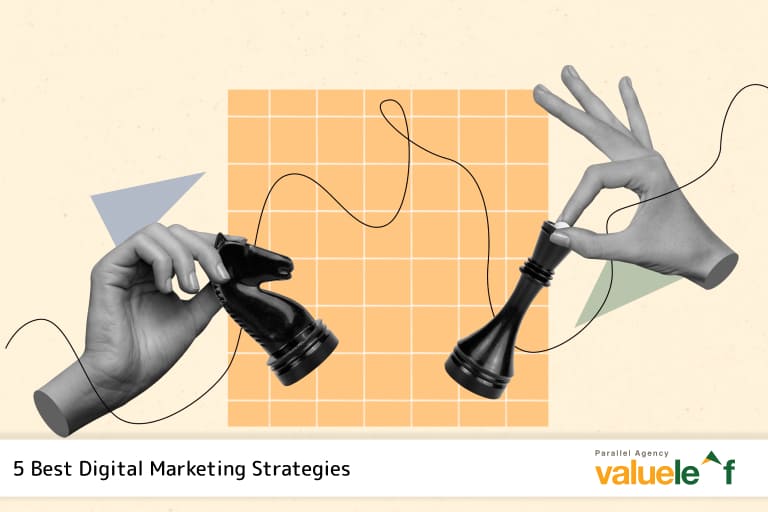Setting goals is crucial for business success. To achieve desired outcomes, companies should have defined goals that will drive growth. Among these goals, the most significant are business goals and marketing goals. Understanding what they are will greatly influence the success of your business. While they are closely intertwined, it is essential to understand the distinction between business goals vs marketing goals. In this blog, we will explore these goals, the difference between business objectives and marketing objectives, their relationship, and how they contribute to the business’s overall success.
What Are Business Goals?
Business goals encompass the broader objectives of an organisation. They are high-level targets aligned with the company’s vision and mission. These goals can be long-term, defining the desired achievements of the business. The senior management or leadership team sets these goals and directly influences the strategic direction of the entire organisation. Every employee will play an important role in achieving these goals.
How Are They Important?
Business goals are important because they provide a clear direction and purpose. The reasons why these goals are crucial for a company are:
Strategic Focus:
These goals help an organisation understand and define its long-term vision and its strategic direction. They help with decision-making and resource allocation. It ensures that the company’s efforts and resources are aligned towards achieving the desired outcomes.
Measures Success:
Business goals act as benchmarks for measuring success and growth. By setting specific, measurable, achievable, relevant and time-bound goals(SMART), businesses can keep track of their performance, make adjustments and meet objectives.
Decision-Making And Prioritisation:
Defining business goals helps organisations access their choices and opportunities. This helps with decision-making towards the best initiatives that align with the company’s desired results. Ensuring proper allocation of resources.
Credibility:
Clear goals help to establish credibility, build trust and demonstrate the company’s commitment to delivering outcomes. These goals attract talent, investors, and strategic partnerships that will align with the company’s mission and promote growth.

Examples of Business Goals
By setting business goals, companies can enhance their competitiveness, adapt to change, and achieve long-term success. These goals can vary from one company to another; some common examples include the following:
Revenue Growth:
Increasing sales, expanding market share, and generating higher profits.
Customer Acquisition and Retention:
Attracting new customers, improving customer loyalty, and reducing customer churn.
Product Development:
Introducing new products or services, enhancing existing offerings, and staying competitive.
Operational Efficiency:
Streamlining processes, reducing costs, and improving productivity.
Market Expansion:
Entering new markets, expanding internationally, and diversifying business ventures.
What Are Marketing Goals?
Marketing goals, on the other hand, are specific objectives aimed at supporting the business goals. They are mostly short-term goals derived from the business goals and focus on the marketer’s activities and strategies. They provide direction and measurable goals to work towards and lay out the primary objectives of your marketing plan. Marketing goals are tactical, providing a roadmap for marketers to drive their initiatives effectively.
Importance of Marketing Goals
Marketing goals play a crucial role in the success of a business. They provide direction, focus, and a framework for marketing strategies. Some of the key importance of marketing goals are:
-
Strategic Focus:
Marketing goals help to align marketing efforts with the broader objectives of the business. They provide a clear direction and ensure marketing efforts align with the business goals.
-
Measurement And Evaluation:
These goals provide the business with a basis for measuring the success and effectiveness of marketing campaigns. This helps them track their progress and campaign performance and make informed decisions for future campaigns.
-
Resource Allocation:
Marketing objectives help businesses efficiently allocate their resources, such as budget and time. This helps them focus on performance and growth.
-
Customer Focus:
Having clear objectives related to customer retention, acquisition, and satisfaction will help companies better understand their target audience. Thereby promoting lead generation and business success.
Understanding what a marketing goal is and its importance will guide the decision-making process, resource allocation, and performance evaluation of businesses. This helps them stay focused, competitive, and customer-centric while also achieving business goals in the long run.

Examples of Marketing Goals
By knowing the examples of marketing goals, you will understand what business goals vs marketing goals include. These goals will differ from one company to another; some examples of marketing goals are:
Brand Awareness:
Increasing brand recognition, improving brand perception, and expanding the customer base.
Lead Generation:
Attracting potential customers, capturing their information, and nurturing them through the sales funnel.
Customer Engagement:
Encouraging customer interactions, fostering brand loyalty, and driving customer advocacy.
Market Penetration:
Increasing market share, targeting new customer segments, and gaining a competitive edge.
Marketing ROI:
Maximising return on marketing investments, measuring campaign effectiveness, and optimising marketing efforts.
Business Goals vs Marketing Goals: The Differences
The difference between business objectives and marketing objectives will differ depending on each company and its end goals. Some of the general differences between the two are:
| Category | Business Goals | Marketing Goals |
| Focus | Overall business objectives. | Specific marketing objectives. |
| Scope | Broad and strategic | Narrow and specific |
| Purpose | Long-term vision and growth. | Short-term campaigns and initiatives. |
| Audience | Stakeholders and shareholders. | Customers and target audiences. |
| Metrics | Financial performance and market share. | Lead generation, conversions, customer acquisition. |
| Resource allocation | Allocates resources for various departments. | Allocates marketing budget and time. |
| Measurement | Measured against financial and strategic goals. | Measured against marketing-specific metrics and KPIs. |
Relationship Between Business Goals And Marketing Goals
You may wonder what qualities the goals must share to connect marketing goals to business goals. Well, business goals and marketing goals are interdependent and mutually supportive. Marketing goals serve as a bridge between the broader business objectives and the execution of marketing strategies. By aligning marketing initiatives with business goals, companies can drive growth, increase profitability, and enhance overall performance.
Marketing goals help create targeted campaigns, engage the right audience, and generate measurable results that contribute to achieving business goals. Successful attainment of marketing goals positively impacts the organisation’s ability to reach its objectives.
Key Takeaways
While business goals provide the company with its overall direction, marketing goals are essential in turning those goals into workable strategies. Businesses can create thorough marketing plans that successfully support their growth objectives by recognising the difference between business goals vs marketing goals.
Moreover, aligning these two goals enables companies to drive customer acquisition, enhance brand visibility, and ensure success. By continuously evaluating and adapting both business goals and marketing goals, organisations can remain agile, competitive, and responsive to changing market dynamics, promoting growth and success in the long run.
FAQs
Q. How different is a marketing goal compared to a business goal?
A. A marketing goal falls under the general category of business goals and consists of specific objectives.
Q. What is a business goal in marketing?
A. A business goal in marketing refers to objectives that drive marketing strategies.
Q. What is the difference between business and marketing?
A. Business goals include the entire organisation, while marketing promotes products and services.
Q. How do you set marketing goals based on business goals?
A. Marketing goals can be set by identifying objectives that contribute to overall business objectives.
Q. What should a marketing goal include?
A. A marketing plan should include specific, measurable, achievable, relevant and time-bound (SMART) criteria.




